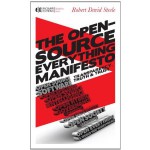
The Open Source Everything Manifesto: Chapter 4 Philosophical Concepts Extract II
The sharing of truth in the form of widely available information creates a foundation for cost-effective transparent decisions that are inherently anti-corrupt in nature.
. . . . . . . .
Where the philosophy gets interesting, even challenging, is when it confronts the reality that dogma, opinion, and deception can create in the mind a view of reality that is not real, but that one considers to be truthful. This gets to the heart of why education is the root requirement and right of each individual in any true democracy, and why democracy dies when dogma, ideology, and propaganda flourish. Truth is our best effort to see reality as it really is, and make the most of it. And please note that science, faith, and philosophy should not be considered antithetical to one another.
. . . . . . . .
The moral truth is worth dying for–sometimes a burning monk (Viet-Nam) or fruit seller (Tunesia) is the catalyst needed to illuminate the culture of fear and lies such that the public reconnects to its own power to be the truth, to define the truth, to demand the truth. How we seek, sense, and share with one another is a function of, among many variables, on constant: whether we are in a state of grace such that the truth is the primary attribute of all that we see, smell, touch, and sense.
Review of the Book by Ralph Peters … Manifesto Extracts at Phi Beta Iota … Book Page at Amazon . Book Page at Barnes & Noble . Book Page at McNallyRobinson . Book Page at North Atlantic Books (Publisher) . Book Page at Powell’s Books . Book Page at Random House . Book Page at Super Book Depot



